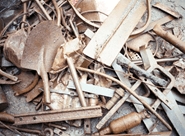Prices

November 26, 2019
Scrap Prices to Move Higher in December-January
Written by Tim Triplett
In what will be seen as supportive of higher domestic steel prices, ferrous scrap prices are expected to jump by $30 per ton or more in December on tight supplies and improving demand in the U.S., following on a similar increase in November.
“Going into December and year end , the U.S. scrap market has resumed its traditional seasonal characteristics. With the beatdown the market took in the first 10 months of the year, the flow of obsolescent scrap has slowed noticeably and won’t pick up without a price increase until March/April depending on the severity of the winter. Therefore, the December market is poised for a jump,” said one SMU source.
“Expectations over the next 30-60 days are for scrap to move up closer to $40,” said another scrap executive. “If the dealers don’t think they are getting enough money on December sales, they will hold back the volumes they offer.”
“I think both sides of the aisle are viewing the upcoming market as 60 days and projecting scrap price increases of $40-50/GT during that period,” agreed another dealer. “December prices most likely will rise at least $30. Even at this level, suppliers will lower volumes because of the expected January increase and concerns about inbound flows throughout a short December.”
He added: “Many mills are trying to secure tons this week with TBD pricing, but finding little success.”
The expected increases will be on top of November scrap prices that settled around: Shred, $235/GT; Bush/Bundles, $250-265/GT; HMS, $205/GT; and Plate, $230/GT.
Export demand is stable with the latest sales around $260 per ton CIF, “but it’s hard to see it rising much more without overseas rebar prices rising,” said one source.
“The export markets are firm with Turkey still buying scrap at stable prices,” added another. “There have been a dozen cargoes sold from the U.S. over the last 30-45 days. So, those tons are off the domestic market and unless there’s a big bump in domestic prices, the coastal tonnages will continue going abroad.”
The mills have announced multiple increases in flat rolled and plate prices over the past month, prompting a turnaround in finished steel prices that they hope will continue into next year—most likely helped along by higher scrap costs. As one executive commented: “If manufacturing demand is indeed improving as some recent data indicates, then the worst of things may be behind us, though I don’t expect a vast improvement quickly.”
Commenting on the pig iron market, one executive reported that the price of pig iron has risen toward $325-330/MT CFR. “There’s nothing left in North Brazil until February shipment and the Chinese have taken the South Brazilian production through January, phos levels notwithstanding. The Russians and Ukrainians have some left to sell, but not much, and they aren’t giving it away with the U.S. scrap market on the rise.”







